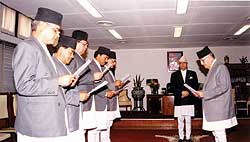 The rancour within the Rastriya Prajatantra Party over Prime Minister Surya Bahadur Thapa's first cabinet appointments reflects the ex-panchas' rapacity. Don't let the ugliness blind you to the elegance of the moment: Deepak Bohara lectures the premier on the principles governing party-government relations, Niranjan Thapa expounds the constitutional and political prerogatives that come with the restoration of the prime minister's executive authority, Kamal Thapa sings paeans to press freedom.
The rancour within the Rastriya Prajatantra Party over Prime Minister Surya Bahadur Thapa's first cabinet appointments reflects the ex-panchas' rapacity. Don't let the ugliness blind you to the elegance of the moment: Deepak Bohara lectures the premier on the principles governing party-government relations, Niranjan Thapa expounds the constitutional and political prerogatives that come with the restoration of the prime minister's executive authority, Kamal Thapa sings paeans to press freedom. These men come from a tribe reared in an unadulterated Panchayat ambience. Unlike first-generation panchas, mainly party leaders and functionaries who were coerced or enticed into the palace-led polity, they were free to choose right from their student days. The conventional wisdom that the Rastrabadi Swatantra Bidyarthi Mandal was a throng of thugs obscures much of the picture. No amount of state sponsorship could have created a formidable band unless the members had some shared values.
Like most of their contemporaries, these students could have become kangresi and communist supporters. Why did they choose to tell on them? Monopolising the patron-client relationship that reinforced the Panchayat superstructure must have been a major motive, but not the only one. Maybe they genuinely believed that if King Mahendra hadn't stepped in first with his partyless platform in the profoundly polarised international and regional climate, one of the key kangresis would have had to become our own Kenneth Kaunda peddling a one-party program.
Few mandales must have been aware of the exigency of the external environment when they converged on Tribhuvan International Airport on 30 December, 1976 to wave black flags at BP Koirala and Ganesh Man Singh and mock their national-reconciliation plea. The influence was instructive. If Indian Prime Minister Indira Gandhi's state of emergency hadn't hardened South Asia's political discourse in 1975, the second amendment to the Panchayat constitution later that year might have embraced a wider constellation of kangresis.
The student movement that culminated in the referendum prompted an official ban on mandales. (Politicians who outlaw their ilk to make way for rivals are either paranoid to the core or congenital conspirators.) In their search for space, the mandales made a smart choice. They infiltrated the flocks of kangresis and communists flexing their muscles on college campuses across the kingdom.
Some of these toughies would probably have become ardent multiparty enthusiasts way back in 1980 if the Janata Party was still in power across the southern border when our referendum was held. Indira Gandhi, who stormed back to office five months before Nepalis voted, was a known votary of direct engagement with the palace. The outcome was preordained. In retrospect, the panchas had greater reason to thank Indian voters for another decade of dominance.
Throughout the 1980s, the pejorative "mandale" stuck with the well-built boys of the National Sports Council. The pioneers took part in the two adult-franchise elections and a few became ministers as elected or nominated legislators. Some also headed the leading sports associations that collectively constituted a parallel government. The mandal's founder president, Padam Thakurathi, represented the liberal strain as a newspaper editor. He nearly lost his life for his exposes on an underground fraternity many of us thought he was part of. In the end, the tribe could adjust to the restoration of multiparty politics so comfortably because they were perpetually prepared.
The malleability of ex-mandales is perhaps rooted in the reality that they didn't have to spend time in prison for their political convictions-although some did for their personal misconduct. Unfamiliar with the bitterness that incarceration, exile and ostracism breed, they can speak of consensus with greater ease.
If Presidents Vladimir Putin of Russia and Aleksander Kwasniewski of Poland can leave behind their totalitarian communist baggage, don't our right-wing autocrats deserve a chance to reinvent themselves?
The post-October Fourth period provided an opportunity. We don't know whether the RPP's non-confrontation campaign was responsible for Lokendra Bahadur Chand's resignation, as its leaders claim. The party did become the principle beneficiary.
Maybe the leaders resolved to stay away from the street's raucous discussions on post-monarchy democracy because they visualised Afghanistan and Iran, while the agitators saw images of France and Germany.
To be sure, it will be difficult for the RPP to cast off the M-word. The party should quit trying, because it no longer is the slur it used to be. The word has acquired a generic connotation embodying all those scandalous attributes everybody sees in everybody else today. Time is a great equaliser.


